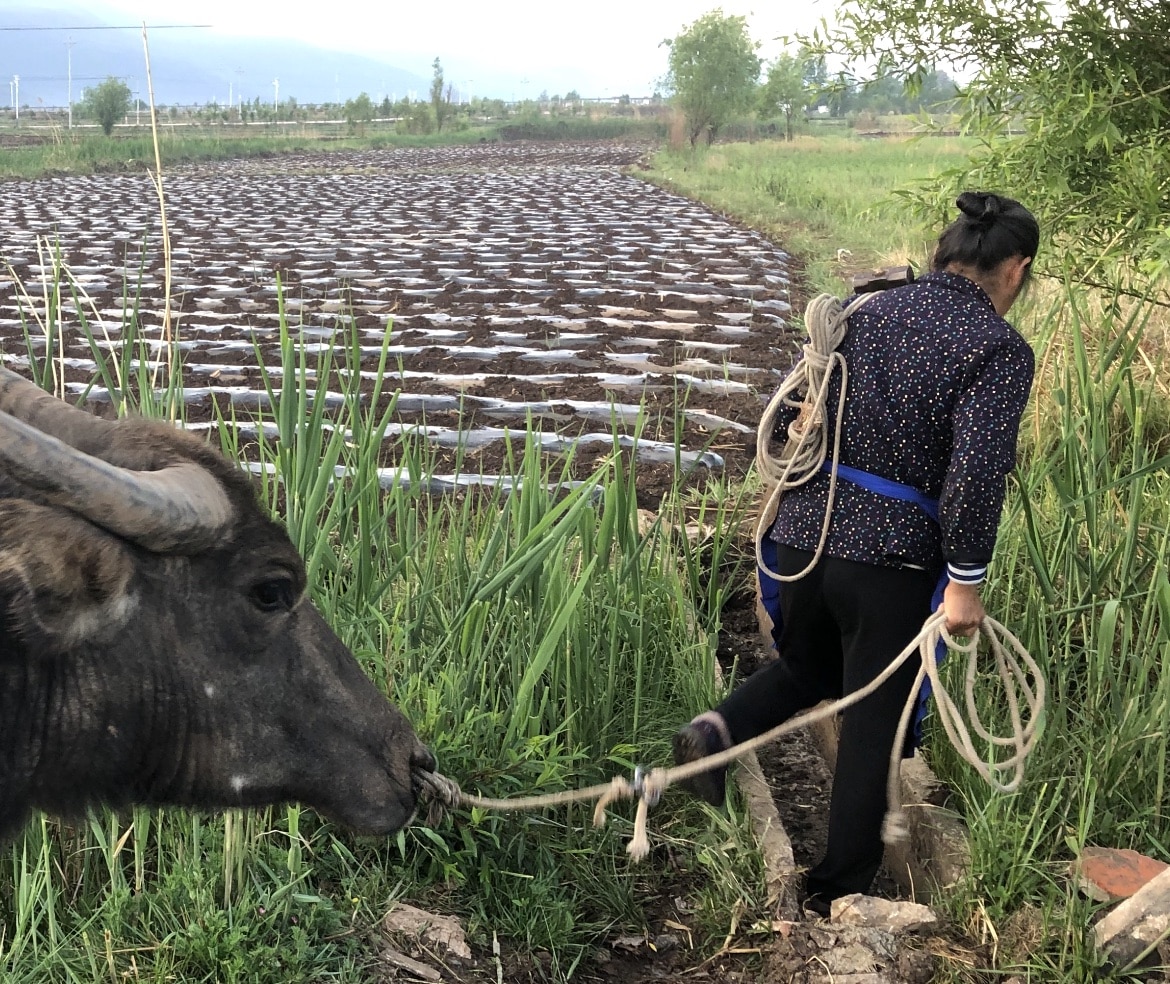The important question underlying all problem-solving methods is: “Do I believe God is holy?”
Dr Tan Lai Yong // September 22, 2023, 2:45 pm

Reflecting on a peacemaking attempt gone wrong, Dr Tan Lai Yong writes of lessons learnt out of a situation in which "I caused a lot of sadness and bitterness". Photo of a farmer in Yunnan, courtesy of Dr Tan Lai Yong.
In Exodus 15, Miriam sang a beautiful song, exalting the Lord who is strength and salvation, who had brought them out of Egypt.
In Numbers 20, Miriam died.
Her death sparked off a festering rebellion.
The people quarrelled with Moses and Aaron. They decried that there was no water to drink and that they were all going to die. They were angry with Moses and Aaron for bringing them out of Egypt.
Was God really their strength or salvation?
Multi-pronged guidance
At times, in overly spiritual settings, we think of God’s guidance as mostly to do with divine interventions like the pillar of cloud and fire.
Yet, in the book of Numbers, guidance came with the pillars, as well as through interactions with the people who led (Miriam being one of them) and the policies that were prescribed.
- The pillars set the direction.
- The words and actions of the leaders settled the daily problems.
- The policies gave a foundation for, among other things, good routines and public health.
The list of rules and regulations on public health policy (Numbers 15) detailed what should and should not be done during animal sacrifices.
It made me wonder … how to apply facets of Numbers 19 if I had to take an eight-hour ride in the back of an ambulance, me sitting beside a deceased person: Would I get some hyssop for cleansing?
God’s holiness
After Miriam died and the people rebelled, Moses and Aaron fell before the presence of the Lord.
The Lord told Moses to speak to the rock and it would yield water, to provide drink for all the people and the livestock.
Then Moses and Aaron gathered the assembly together before the rock, and he said to them, “Hear now, you rebels: shall we bring water for you out of this rock?” And Moses lifted up his hand and struck the rock with his staff twice, and water came out abundantly, and the congregation drank, and their livestock.
The water flowed after the two strikes but sadly, the quarrelling mood remained unquenched.
And the Lord said to Moses and Aaron, “Because you did not believe in me, to uphold me as holy in the eyes of the people of Israel, therefore you shall not bring this assembly into the land that I have given them.” (Numbers 20:10-12)
Moses getting water out of the rock as instructed by the Lord would be a re-run of Exodus 17. In that episode, the Lord instructed Moses to strike the rock at Horeb by the Nile to release water.
By contrast, in Numbers 20, the Lord instructed Moses to speak to the rock. Moses struck the rock with his staff instead.
The water flowed after the two strikes but sadly, the quarrelling mood remained unquenched.
It caused me to recall … a time when I was meant to be peacemaker but I turned out to be a troublemaker.
The farm project
There was a new farm project that was going well. I visited the place occasionally and were friends with the folks who started it.
The farmland with its fruit trees looked much like a land of milk and honey – the trees were growing well, which generated strong anticipation of harvest in several years’ time.
There were village folks from several distant communities being trained to care for these high-yield trees and would one day bring back their wealth of knowledge and skills to their own villages far away.
I went against tried and tested principles of teamwork. I caused a lot of sadness and bitterness.
The long-term vision of the farm was to empower disciples to bring good skills, good produce, and the Good News back into remote impoverished regions. Good vocational skills and good Christian discipleship were being shared and learnt.
In the meantime, while waiting for the trees to mature, the innovative staff planted green vegetables that could be harvested every few months.
I happily introduced a local buyer.
But the vegetable transactions did not go so smoothly.
There was a bit of friction. Somehow I got involved and instead of listening to different sides of the story, I wrote a letter to the bosses – “pillar to pillar” was my mindset; “don’t let small matters get into the way of the long-term vision of the farm”.
However, in bypassing the staff, my well-intentioned letter to the bosses was like Moses’ impetuous strike on the rock.
The people on the ground were hurt.
I caused even more friction. I neglected the good and sound policies of listening to people, and went against tried and tested principles of teamwork. I caused a lot of sadness and bitterness.
My “chop chop” strike of problem-solving caused wounds and fractured relationships.
Years later, I met with folks who were very hurt in the process to apologise. They graciously accepted my apologies, but I could see that the hurt I had caused had long-lasting effects.
My “chop chop” strike of problem-solving caused wounds and fractured relationships.
I learnt that … We may be guided by pillars that lead us to new lands and we can, at times, apply “out-of-the box” methods. But it is foolish to ignore the people and to throw away well-prescribed policies.
Two quotes from GK Chesterton help:
- “There are no rules of architecture for a castle in the clouds.”
- “Don’t ever take a fence down until you know the reason it was put up.”
The critical issue
In Psalm 90, Moses prayed:
“For we are brought to an end by Your anger;
by Your wrath we are dismayed.
You have set our iniquities before You,
our secret sins in the light of Your presence.” (Psalm 90:7-8)
Moses was a humble leader. Unlike David, who committed adultery and schemed a murder, there is no record of Moses having “secret” sins. His life was lived transparently before the Israelites as he led them through the Exodus journey.
Lying beneath whichever method used for the occasion is the important question: “Do I believe that God is holy?”
So what were the “secret sins” that he confessed in the writing of Psalm 90?
Perhaps the answer is found in the Numbers 20 episode of striking the rock when the Lord had instructed him to speak to the rock.
Some decisions are made looking at the pillar of cloud and fire. Some decisions are made when prophets speak and instruct. Some decisions are made because of polices and protocol.
I realised that … Lying beneath whichever method used for the occasion is the important question: “Do I believe that God is holy?”
And if I do, how does that impact the way I relate to people, and to the mission and tasks that God has given me to do?
Growth and maturity
Christian growth is more than overcoming crises or using the rightful method of getting water from the rock.
Christian growth is to bring all our life into the light of God’s presence, so that quarrels cease and God’s peace reigns.
It is as Moses prayed – to bring all our life, including our “secret sins” of unbelief and self-propelled ways of problem-solving, into the light of God’s presence, so that quarrels cease and God’s peace reigns.
Thus, we do well to have the Aaronic blessing in our hearts when solving problems:
The Lord bless you and keep you;
the Lord make His face to shine upon you and be gracious to you;
the Lord lift up His countenance upon you and give you peace. (Numbers 6:24-26)
And to have Moses’ prayer in our hearts when we work alongside people:
Let the favour of the Lord our God be upon us,
and establish the work of our hands upon us;
yes, establish the work of our hands! (Psalm 90:17)
This is the final part of Dr Tan Lai Yong’s four-part devotional series on the guidance of God.
Linked to the book of Numbers and to the prayer that Moses wrote in Psalm 90, the reflections recall times when Dr Tan was “so sure and yet had it wrong; was led so clearly yet I looked the wrong way or crept up the wrong alley”.
MORE STORIES:
A God that sees giants as well as grasshoppers: Dr Tan Lai Yong
We are an independent, non-profit organisation that relies on the generosity of our readers, such as yourself, to continue serving the kingdom. Every dollar donated goes directly back into our editorial coverage.
Would you consider partnering with us in our kingdom work by supporting us financially, either as a one-off donation, or a recurring pledge?
Support Salt&Light


![[NEWEST] Pic with Dad Horizontal - Pic 2 Version 3 (2018)](https://saltandlight.sg/wp-content/uploads/2023/10/NEWEST-Pic-with-Dad-Horizontal-Pic-2-Version-3-2018.png)

